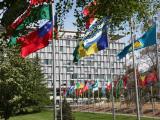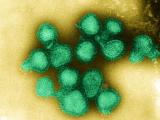(CIDRAP Source Weekly Briefing) – Three very different events in the past 2 weeks underscore that pandemic preparedness fatigue may have evolved into pandemic lethargy—and important lessons are being lost in the process.
The events include:
- Congress, together with the Bush administration, cutting $650 million in 2007 pandemic preparedness funding
- Wales dealing with an outbreak of avian influenza (H7N2) in poultry, which led to humans becoming sick after contact with infected birds, and then likely subsequent person-to-person transmission of the illness
- The much-publicized episode of an Atlanta lawyer taking two transatlantic flights while he was infected with extensively drug resistant tuberculosis (XDR-TB)
What, you may ask, does this trifecta of events have to do with H5N1 infection and the next pandemic?
The events tell us much about our current state of preparedness for the next pandemic—whatever influenza virus causes it—and the public's state of mind regarding what priority we place on getting better prepared for that pandemic. Let me explain.
Teachable moment #1: Keep your eyes wide open, even if others shut theirs
What would have been a big flu story 18 months ago drew a big yawn from the media last week. Not one media venue in the United States (except CIDRAP News) covered the fact that Congress, in conjunction with the White House, deleted $650 million for pandemic preparedness from the 2007 emergency spending bill that was subsequently signed by President Bush May 25.
Why does this matter? These funds were largely dedicated for vaccines, antivirals, medical supplies, and diagnostic and surveillance tools—a critical part of the nation's overall preparedness effort. They represent part of the initial commitment that the president made in November 2005 to provide at least $7.1 billion for pandemic preparedness.
The cuts are bad enough—but what is even worse is that the media dozed right through it. The teachable moment—that deleting such critical funding is truly short-sighted—came and went. Jay Rosen, the former chair of the Department of Journalism at New York University, once wrote: "Philosophers disagree on whether a tree falling in the forest makes a sound, if no ear hears it. But it is certain that the tree does not make news."
Teachable moment #2: Watch your back and your front and your sides
The outbreak of H7N2 avian influenza in poultry in Wales may seem insignificant in terms of the number of people affected (12 so far) and its severity (eye infections and a nonserious flulike illness). But such an outbreak is exactly the type of situation that could sneak up on us and suddenly produce the next pandemic influenza virus.
The British public health officials appear to have responded to this situation with a comprehensive and timely intervention, but the outbreak is nonetheless worrisome. The teachable moment lost: There will be a next pandemic, and it might not be due to the H5N1 virus. Unfortunately, the world's media was mostly AWOL on reporting the true significance of this situation.
Teachable moment #3: An emerging pandemic cannot be stopped
The final event of the preparedness trifecta relates to the recent XDR-TB case that has captured the world's media attention. Ironically, the risk of this patient's transmitting TB to his fellow passengers was likely very low. Granted, if XDR-TB is transmitted to any of the passengers, the consequences will be high, given the serious outcome of this infection. Today such an infection carries at least a 60% risk of death within a year of the first appearance of symptoms.
The circumstances surrounding this event and their implications deserve many words of discussion, though I can't cover all the ramifications here. I do have to say that I'm troubled by the public's perception that if the Centers for Disease Control and Prevention had just done its job correctly, this infected passenger would never have made it on a plane. I'm troubled because such a perception plays right into the idea that we don't need to do much more to prepare for these types of events; just do our job. Of course this is dead wrong. The issue that truly deserves examination is the fact that a single passenger with a diagnosed infectious disease stretched our country's public health capacity to detect and respond to it.
When we see the onset of the next pandemic, individuals who are infected with the pandemic virus but not yet ill are likely to be scrambling to leave the geographic area where the pandemic is emerging. They will get on planes and will infect other passengers. Count on many such passengers in those early days. This is one of the reasons that I never have had any faith in our ability to stop an emerging pandemic in the country in which it begins.
The lost teachable moment could have helped the public understand that: Trying to stop a respiratory-transmitted infectious disease (such as pandemic influenza) from hopping continents by identifying infected passengers is doomed to fail. Unfortunately, this discussion has been all but absent from the deliberations of the day.
Keep the issue front and center
These events highlight the challenge we have in keeping pandemic preparedness on the front burner. As disappointing as these current events may be with regard to preparedness, we have no choice but to slug it out every day in the preparedness trenches and use every teachable opportunity to further the preparedness agenda.
Our future depends on it.
—Michael Osterholm




















